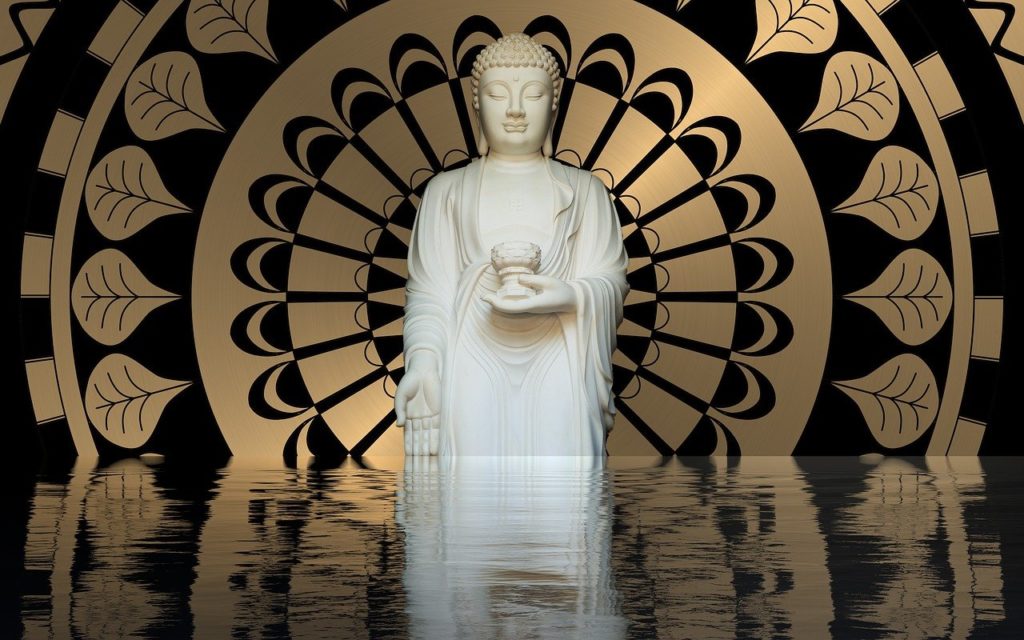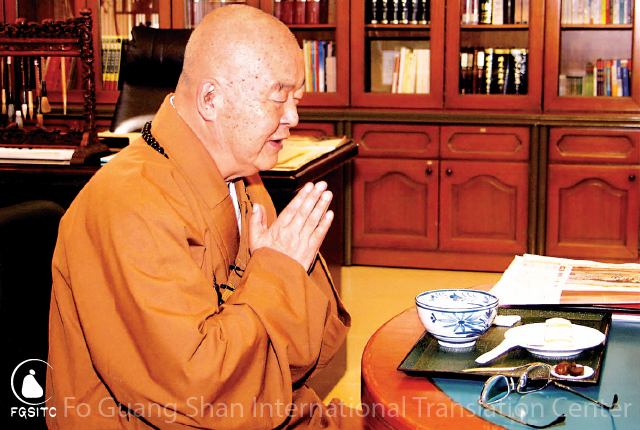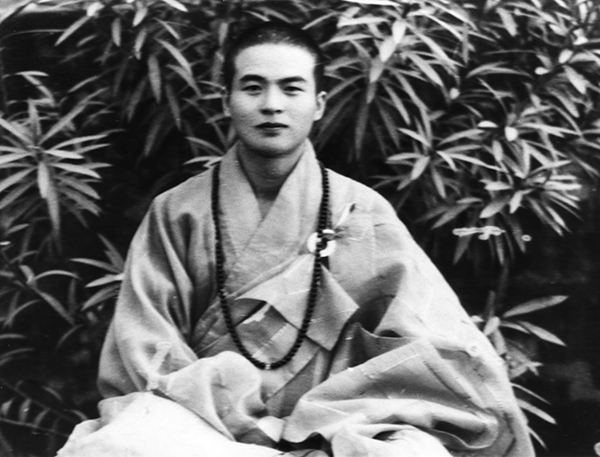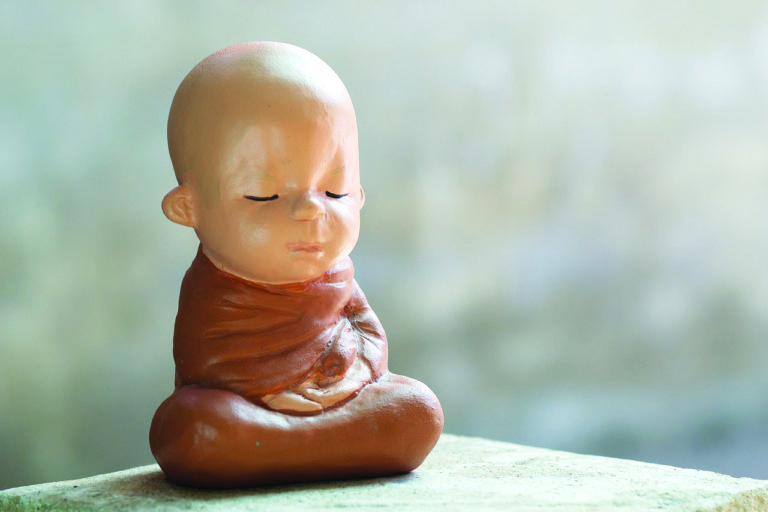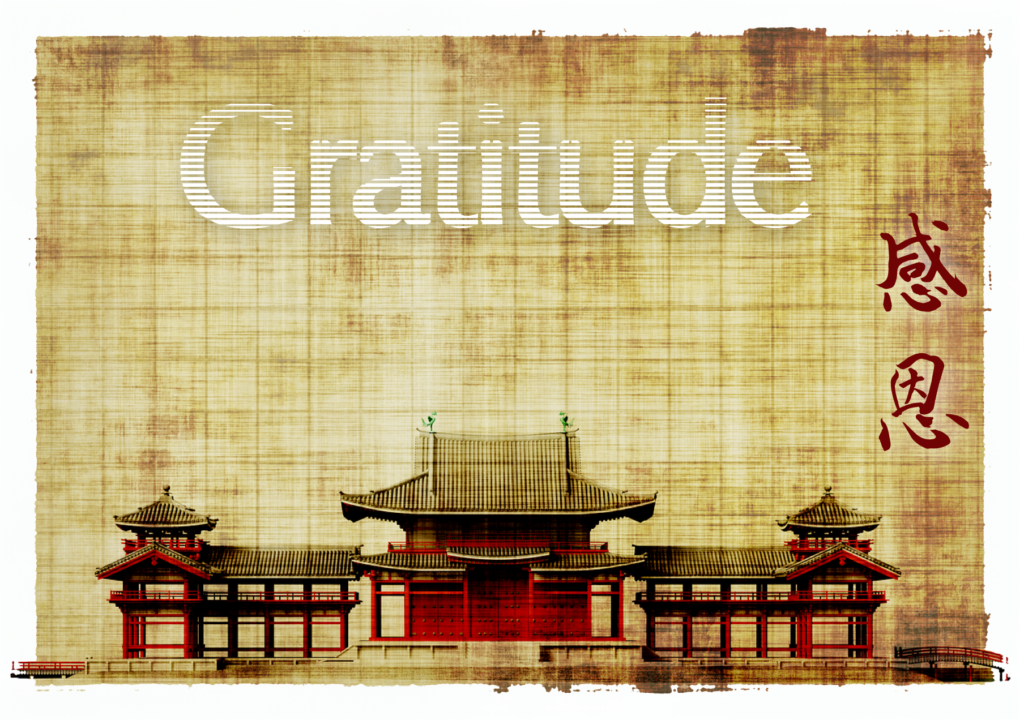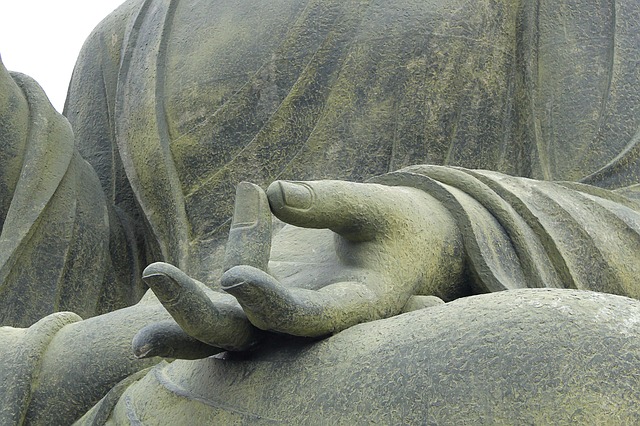
In Buddhism, the root cause of human suffering and other problems are identified as the mind. It thus proposes to tap into this invaluable resource by transforming any unwholesomeness into wholesomeness. Buddhism instructs sentient beings on how to recognize the mind, calm the mind, and handle the mind. The Buddha taught for forty-nine years during his lifetime. Whether his teachings were about the four noble truths, the twelve links of dependent origination, the six paramitas, or the four means of embracing, they invariably involved the mind. The mind dictates a person’s behavior. If a person’s mind is pure, all of his or her thoughts, speech, and actions will also be pure. If a person’s mind is impure, then what he or she hears and sees will be impure. Therefore, it is said in one sutra,
“When the mind is impure, the being is impure; when the mind is pure, the being is pure.”
Modern medicine is very advanced, and all kinds of pharmaceuticals are widely available. The great variety of drugs corresponds to the numerous ailments modern people now experience, many of which were nonexistent before. However, while it is true that there are illnesses and cancers in our physical bodies, aren’t there cancers in our minds as well? Greed, anger, ignorance, arrogance, and doubt are illnesses we cannot ignore. When we have physical disorders, we treat them with medicine, injections, or nutritional supplements. There is an old Chinese saying, “Medicine can only cure symptoms of ailments. It will not heal the real illnesses.”
The real illness is the illness of the mind.
As a matter of fact, many physical diseases are caused by psychological factors. The most obvious examples are illnesses of the stomach and digestive system. Eighty percent of these disorders are related to emotional distress. If we can maintain a balanced and peaceful mind, many diseases will disappear.
If we have a psychological disorder, what medicine will benefit our spirit? The Buddha created eighty-four thousand instructions to remedy our eighty-four thousand tenacious maladies. For example, if we do not eradicate greed by upholding the precepts, our minds will act greedy and run wild. If we do not overcome anger by practicing meditation, our spirit will live forever in a “flame of fire,” making true tranquility difficult to reach. Finally, the affliction of ignorance can only be cured by wisdom because wisdom is capable of penetrating the darkness of ignorance, uncovering the magnificent and tranquil state of the original mind.
In addition to the major illnesses caused by the three poisons, there are all kinds of psychological sicknesses that need to be healed, transformed, or overcome. The following are treatments prescribed in the Buddha’s teachings:
A calm mind is the antidote to a busy mind. The tempo of modern life is rather fast and compacted. Most people suffer from distress caused by anxiety and insecurity. Therefore, in our daily lives, it is beneficial if we take a few minutes to practice the art of self-healing through mind calming and purification. When the “impurities” in our minds are cleansed, insight and wisdom will emerge from calmness.
A benevolent mind is the antidote to a malevolent mind. The mind sometimes is like that of a “sage,” but at other times like that of a “troubled one,” rambling here and there between the positive and the negative. When the benevolent mind arises, everything goes well; when the malevolent mind arises, millions of defilements result. Therefore, we must eradicate the unwholesome mind and guard and keep our correct thoughts to cultivate a mind of loving-kindness and compassion.
A trusting mind is the antidote to a doubtful mind. Many mistakes and tragedies in the world are due to doubt and suspicion, for instance, suspecting the betrayal of a friend, infidelity of a spouse, or ill will of a relative. When doubt arises, it is like a rope restraining the body, making movement almost impossible. The Great Perfection of Wisdom Treatise [Mahaprajnaparamita Sastra] says, “The Buddha’s teachings are as large as an ocean. Trust provides the only means to reach it.” Building trust not only allows us to realize the truth in the Buddha’s teachings, it also enables us to be more tolerant toward others, to accept the world as it is, and to strengthen our belief in the Dharma.
A true mind is the antidote to a deluded mind. Because of attachments to the notion of self, personal preference, and judgment, ordinary people’s minds are constantly discriminating and deliberating, creating countless illusions and unwarranted responses. To lead a life of truth, beauty, and virtue, we must use our minds without discrimination or duality, perceive things as they are, and treat all sentient beings as inherently equal.
An open mind is the antidote to a narrow mind. We need to make our minds like an ocean, capable of receiving all the water from hundreds of rivers and tributaries without changing their characteristics. Only an all-embracing mind of gratitude and forbearance can relieve us from a jealous and intolerant mind.
A balanced mind is the antidote to a fragmented mind. If material wealth is the only thing we value in life, we will feel anguished if we lose our fortune. If ordinary love is the focal point of life, we will suffer tremendously if that loving relationship can no longer be maintained. Whenever there is grasping and clinging, there is differentiation and bondage. How can one be free? It is better that one reacts to the transient, worldly possessions and attached illusions with an even and equanimous mind. In doing so, one will become free and unperturbed at all times and during all occasions without any attachment or restriction.
An enduring mind is the antidote to an impermanent mind. Although Buddhism maintains that all things and phenomena, including thoughts and feelings, are impermanent and constantly changing, it also holds that when we vow to serve others and not just ourselves, the power of the vow and devotion is so immeasurable that it reaches beyond the universe. The Flower Ornament Sutra says, “As soon as one invokes the bodhicitta (the vow to attain Buddhahood), one is immediately enlightened.” A bodhisattva who has just pledged his or her vow has a mind as pure as that of the Buddha’s. However, he or she must maintain that momentum, without falling back, in order to attain perfect enlightenment.
An unattached mind is the antidote to an impulsive mind. Modern men and women fancy novelties and fads. They are curious about any new gimmick and thus become easy targets of bizarre and eccentric scams and frauds perpetrated by con artists. Chan Buddhism states, “an unattached mind is the path to enlightenment.” Maintaining an unattached mind in daily life will enable us to appreciate that “every day is a delightful day; every moment is an enjoyable moment.”
In addition to these eight observations, we should cultivate a mind of patience, humility, thoughtfulness, filial piety, sincerity, honesty, innocence, purity, loving-kindness, forgiveness, joyfulness, charity, reverence, equanimity, forbearance, contrition, repentance, thankfulness, wisdom (prajna), compassion (a trait of a bodhisattva), and enlightenment (a trait of a Buddha) in order to fully develop its boundless potential.
From Buddhism and Psychology, written by Venerable Master Hsing Yun.
Image from Pixabay.

